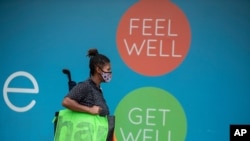On the surface, the news about Janssen Pharmaceuticals' coronavirus vaccine was disappointing.
On January 29, the company, a division of health care giant Johnson & Johnson, announced its shot was 66% effective against moderate to severe COVID-19.
It's a lackluster result compared with the 95% that Pfizer-BioNTech reported for its vaccine, or Moderna's 94%.
Most disappointing were the data from South Africa, where a new variant of the deadly coronavirus has been running rampant. The vaccine was only 57% effective there.
The South African variant has spread to dozens of countries, including the United States.
But those headline efficacy figures obscure an important point: Against the most serious cases, the shot was very effective.
"Not a single South African ... ended up needing to go to the hospital," said Janssen Research & Development head Mathai Mammen on a call with reporters. "No South African died that was vaccinated."
The heartening news was that the shot was 85% effective against all severe forms of the disease at all the study sites, in South Africa, Latin America and the United States.
"If the vaccines can prevent us from becoming severely ill and dying, that's still a game changer," said Jennifer Nuzzo, a senior scholar at the Johns Hopkins Center for Health Security. Transforming COVID-19 from a potentially lethal disease to an especially nasty cold "changes our calculus on how much of a threat the virus poses," she said.
Life could begin getting back to normal. Even with new variants appearing, Nuzzo said, "I think the vaccines, coupled with the [masking and social distancing] measures that we are using, work well enough to make me quite hopeful that we are starting on the path to normalcy."
Shape shifter
That's not to say the new variants popping up in South Africa, Brazil, Britain and elsewhere are nothing to worry about.
Especially concerning are those with several specific mutations in the spike protein, which is the part that the virus uses to enter cells and cause infection. The mutations change its shape in ways that make it easier for the virus to get into cells.
Vaccines and antibody drugs target this same protein. So do the body's own immune defenses. Changes in the shape of the protein can make all of these less effective.
The South African variant appears to be especially problematic. In a test tube experiment, researchers studied antibodies from people who previously recovered from an infection with the original coronavirus strain. They found these patients' antibodies were between 11 and 33 times less potent against the South African variant.
That may mean that the South African strain can reinfect people who have already had COVID-19, though that hasn't been proven yet. That would make it harder to reach the point where enough people have protection from the virus to slow its spread, a condition known as herd immunity.
But vaccines still seem to work.
Both Pfizer-BioNTech and Moderna found that in a test tube, their vaccines were slightly less potent against the South African variant than the original virus. But they still seem strong enough to protect the patient.
"It is worrisome, [but] I don't think we're going to see zero efficacy," said Executive Director William Moss of the Johns Hopkins University International Vaccine Access Center.
Even if the vaccines are less effective against preventing infection, they likely knock it down to a milder illness.
That's what happens with flu vaccines, National Institutes of Health Director Francis Collins noted during a call with reporters. The shots are only 60% effective in a good year, but people who have been immunized tend to get less severe cases.
"Even if you acquire the illness, it's a good thing that you have that vaccine," he said.
"The same thing seems to be applying here," he added. "This variant is clearly making it a little tougher to get the most vigorous response that you would want to have. But still for severe disease, it's looking really good."
A warning
Though scientists are cautiously upbeat that the existing vaccines are still working, the variants are a warning, they say.
"The longer this virus is allowed to circulate, the more opportunities there are for mutations to occur," Nuzzo said. More mutations could weaken the vaccines further. "We need to get the number of people who are carrying this virus down."
Ramping up immunization drives will help. But the measures that have been in place for the last 10 months are still important, she said. Mask up. Avoid large and indoor gatherings. Practice social distancing. Wash your hands.
Meanwhile, vaccine makers are working on tweaking their products to adjust to the new strains. Advances in vaccine technology have made this easier than ever to do.
The next question is how regulators will ensure the modifications are still safe and effective.
The U.S. Food and Drug Administration says it is developing guidance for manufacturers on what data they would need to gather and how to do it quickly.
"Our agency has had experience with evolving infectious diseases," Acting FDA Commissioner Janet Woodcock said in a statement Thursday. She noted the FDA has procedures to update flu vaccines every year.
Changes are not needed yet, however, she added.
"To be clear," Woodcock said, "available information suggests that the authorized vaccines remain effective in protecting the American public against currently circulating strains of COVID-19."
Annual COVID shot?
Just as the influenza virus evolves and flu vaccines have to change every year, the coronavirus variants suggest that COVID-19 will likely behave the same way.
So this round of vaccines probably will not mean the end of the coronavirus.
"There is the false assumption that once you're vaccinated, this COVID virus is going to disappear," said Vanderbilt University infectious disease professor William Schaffner. "That's not the case. The COVID virus is here to stay. We're going to have to cope with it for years down the road."
That might mean an annual coronavirus shot.
"One arm flu, the other arm COVID, that's an easy scenario to imagine," Schaffner said. "We're not there yet, but it could be."







